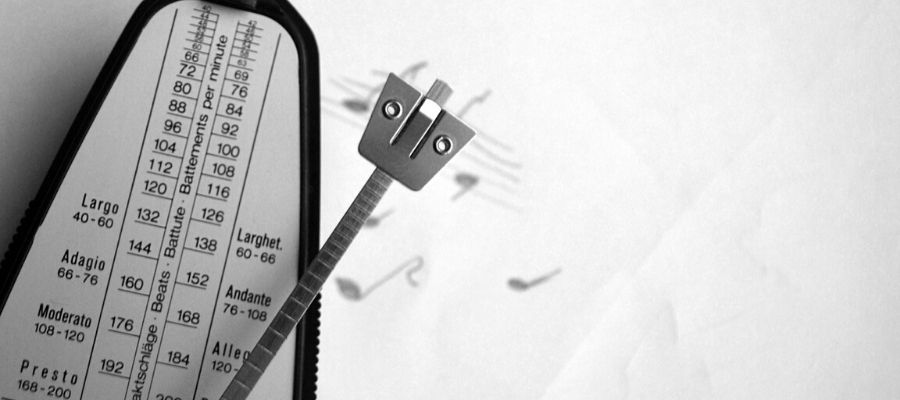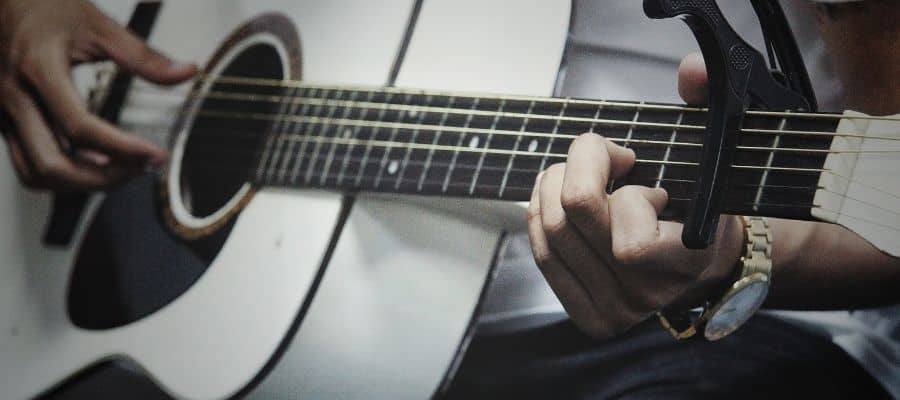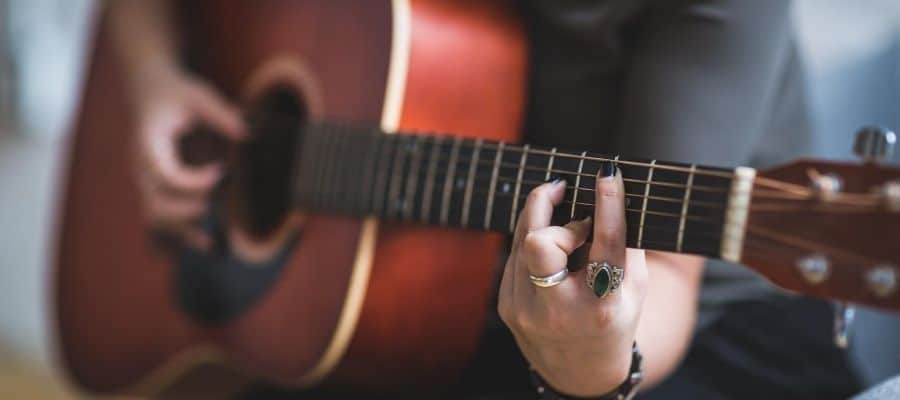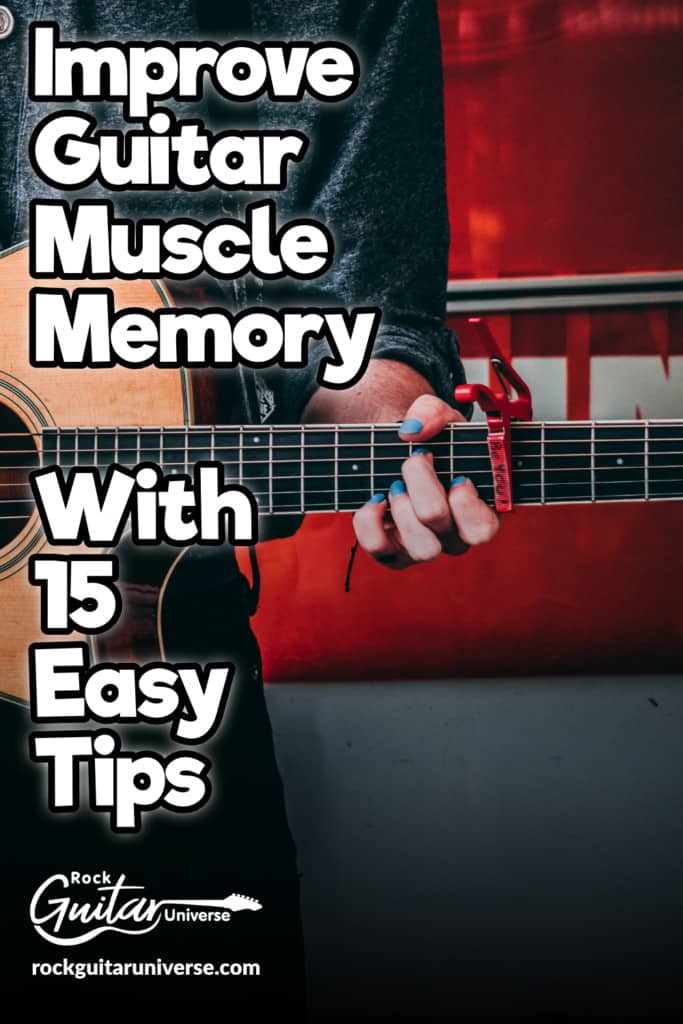When it comes to playing the guitar, muscle memory is one of the most important aspects and things you should work on. While our brains can often forget some licks, scales, and shapes, those patterns will remain for long in our muscle memory. It is important to mention that muscle memory involves both hands/fingers and our brain.
There are several tips and tricks that you can use to improve your muscle memory so let’s just dive straight into it.
Understand What Is Muscle Memory
Even though it is called “muscle”, it all comes back to the brain. It is an unconscious memory of a brain that involves any movement of the body or part of it and achieved through repetitions. You won’t be able to use it to prepare for a physics exam, but you’ll be able to perfect those chord switches if you practice enough.
For years people believed that muscle memory is something that is inside the muscles, but constant repetition will stay in the part of the brain for a long time. Even after our conscious part of the brain has forgotten all about it.
Start Slow

If you hurry to learn something, you will forget it faster than you learned it. It is a fact. Speed is something that comes over time. The best course of action would be to start as slow as possible. Pick a speed that will allow you to play something without making a mistake and keep the tempo.
Use A Metronome
While this could be a tip for itself, it is tightly related to the speed you’ll have when you practice. One of the best advice you can get is to use a metronome. Many guitar players avoid using it for some reason, but it is extremely important to learn to play properly.
Set the metronome to the slow pace that will allow you to play without a single mistake regardless of how slow it is. And then, gradually increase the tempo until you reach that mind-blowing speed. This way, you will both have speed and accuracy. Remember, speed comes with hours of practice and it comes over time.
The worst thing you can do is try to play something fast at the original bpm (beats per minute). Especially if you use an electric guitar with overdrive pedals. Distortion can mask any mistakes you make, and that can make you feel like you managed to accomplish something while the truth is quite the opposite.
If you are still not convinced why you should practice with a metronome, check out my post 15 Important Reasons To Use A Metronome As A Guitar Player
Time Spent Practicing

Almost every guitar teacher will agree that consistency is the key to building muscle memory. By having shorter more frequent sessions, you will achieve more success compared to spending hours at a time and then leaving the guitar for days.
It is a much better option to play every day for an hour for the entire week than to spend one day practicing seven hours and then spend the next six days doing nothing.
This type of practice is ineffective and flawed. Of course, if you can manage to practice every day for seven hours every, you will accomplish wonders.
Shorter sessions are proven to be more effective and to bring better results. So forget about those long marathons if you cannot do it every day of the week.
Muscle Memory Works On Mistakes As Well

One of the tricky things about this type of memory is that it won’t know the difference between right and wrong. What this means is that if you do something bad, or learn something that is not accurate, by practicing it, you will have that in your muscle memory.
Imagine learning the incorrect scale, and practicing it for hours. It will be quite hard for you to play in the key after that because your fingers would simply know the wrong way. Whenever you try to play something, you will simply play out of key, and it will sound bad.
The important thing is that what you practice is correct and that you practice correctly. Don’t let mistakes be part of your muscle memory. You won’t do yourself a favor if you learn to play bad. And those nasty habits will be very hard to overcome.
Learning Chords

We all had trouble learning chords. That is a fact. And don’t let anyone fool you telling you they had an easy time. Going from C to G is hard for everyone at the beginning. By practicing it slowly, even without strumming, you will perfect that fluent motion and chord switching.
Try to figure out what each finger is doing. Find some logic behind it (either music theory or something that you find logical), and focus on that. You can even do it one finger at a time. Again, using the metronome is always a good idea. Set the slowest possible pace, and build your way up.
Over time, you’ll realize that you no longer think about chords at all! You just pick up the guitar and start playing.
f you still don’t know the basic chord then check out my post Beginners Guitar Chords – The Ultimate Beginners Guide
Practicing Something New? Practice In Parts

If you are learning solo, new song, or anything new, break it into small pieces. By dividing a whole thing into chunks, you will study and learn it gradually. It is rather difficult to learn an entire solo from “comfortably numb” in one take. The solo is several minutes long, and you will forget parts, and those you learn might get messy.
To ensure that in the end, you play it properly, you would divide it in a number of segments that will make it easier to memorize and learn. And over time, you will play the whole thing without any issues.
Naturally, there are songs that are harder to play. They either have too many chords, or some tricky bit, or anything else that might make it difficult. There is no shame in that. But if you start slow, and practice each segment, eventually you’ll be able to play it without a single mistake.
Practice Makes It Perfect

The more you practice something, the more you’ll learn and better you’ll get at it, and more accurate you’ll be able to repeat it. There is a reason why we do all those “meaningless” repetitions. We say meaningless because for most beginners those exercises will seem rather pointless. But it is quite the opposite. By learning shapes, scales, and theory, those things will remain for long in our muscle memory.
It is not a rare situation that a guitar player will have no idea how to play something until he takes the guitar and plays it almost without a mistake.
Beat The Boredom Of Repetition

It is natural for you to feel sometimes bored when playing the same thing over and over again. But repetitions are a key for music playing. All the tiny licks, and scales, and everything will do you good in the end.
One of the most effective ways is to split your practice session 50-50. Let me explain; you will spend half of the time playing something you already know, something you mastered. Don’t forget to practice and play the things you’re good at. Another half of the time, you should learn something new.
It is easy for us to focus only on good things and to master only one of the aspects of guitar playing. But it is a bad thing. While it is not as a crucial mistake as others, you will restrain yourself from learning and progressing. Leaving out of your comfort zone even while playing is a good idea.
This way you will always learn something new, and expand and grow as a guitar player.
Think About The Music

Even if you are waiting for a bus or standing in line or anything, you can still think about music. Practice your imagination and your knowledge. You can never know too much about something. Listen to music all the time, and try to discover something new.
There are so many incredible musicians out there, and we sometimes tend to get trapped in a certain music genre. By entrapping ourselves, we deny further expansion and growth. There is no shame in liking something. If you are a blues guitarist, you can still listen to some of the metal bands or pop or basically anything you like. Don’t let anyone tell you that you cannot listen to something!
You might discover some artists that you’ll love and that might influence your music taste and guitar playing. Even if you find just a single lick from some guitar player, it is a success. You can incorporate that lick into your own music style and guitar playing to create something unique and personal.
Learning Shapes And Sounds

The guitar is incredible because of the shapes used to play music. While on the piano, you would have to know theory to play or how everything works, on the guitar you could know only shapes.
Let me explain that. The first fret on the sixth string is F, the third one on the same string is G. Both F major and G major will look the same. Your hand will have the same position and your fingers would be in the same shape. The only difference is that everything will be moved two frets either way.
The same principle works for everything else on the guitar. I believe that it is the main reason why it became so popular in the last seventy years. You could play the guitar without any musical knowledge and background, while that would be more difficult if you opt for a different instrument. Many guitar players out there don’t know how to read sheet music, and they are still legend when it comes to playing.
Elvis Presley, Robert Johnson, Eric Clapton, Van Halen, The Beatles; none of them learned how to read music. But I bet you know every one of them.
So practice all of those shapes slowly and build up your speed. And remember, by learning one chord, you will automatically learn eleven more. And the same thing works with scales as well.
Take Breaks

Remember to take a break. Now we don’t mean a few days or a few hours. But if you are planning on having a longer session, take a little break before continuing. Those little breaks will help you memorize better and will have a large impact on your sessions.
Without taking breaks sometimes you will have a hard time remembering something. It is important to remember that you won’t be able to learn everything in a day. Take your time.
Be Patient

Learning to play an instrument is a huge investment. Of course, if you are one of the people with a goal to learn basics only, you will do that rather quickly. But if you start learning how to play the guitar without limits, without a goal, and with only desire to play and be better, you should know that it will take you a long time.
Music is so complex and there are countless genres and techniques and styles that it is impossible for anyone to learn all of it in a single lifetime. I also believe that this is the best thing about music. You will always have a future goal or something to keep you going.
While it might seem like a pointless journey without an end, if you love music and guitar, you will see something much more beautiful. The possibilities are endless and you will always have to improve and perfect and strive to be better.
It is important to remember that it won’t come overnight, but practicing is important while it is a slow ride, there are few things that can compare to creating music. Whatever you do, you shouldn’t quit. It might seem hard and difficult at the beginning, but all of us went through it. Take it slow and practice. And in time, you will get better and better at it.
Muscle memory requires persistence and patience. You will do no good trying to speed up the process and trying to rush it. Messy practice will lead to messy playing. There is research that says that it takes up to 30,000 repetitions of something until it becomes second nature to you. So keep that in mind and keep practicing.
Think Ahead

There are two ways you can think ahead. The first one is related to practicing and the way you’ll think ahead what is the next part you need to play. Whether you play a chord progression or a solo, it is a good idea to think ahead of what comes next. While playing a certain chord, you should already know what comes next. The same thing goes for the scales and even improvisation.
While improvisation requires you to master the basics and to be able to hear the music to know what you should do next, it all comes with practice. Audio memory will play a major part in this too. If you practice enough, you will be able to memorize how each fret sounds. So you will be able to know where to “find” a certain tone you’re looking for easier.
The second part of thinking ahead is more spiritual. It is good to think of all the benefits and everything good that will come with practice. Whether your goal is to play for your own satisfaction or to play in Madison Square Garden, you will still have something to go toward. It is easier for us to do something when we can imagine the benefits of all the hard work we did.
Don’t Be Too Hard On Yourself

Always remember that when you see someone do something incredible without breaking a sweat, he invested countless hours into it. There is a reason why we always get impressed when seeing famous virtuoso play a ten-minute solo. It always looks like a walk in the park. And then we try to do something like that, and it is never easy.
Remember what we talked about; practice and repetition will make you look like it is not a big deal while you play that mind-blowing solo. Everything needs time and practice.
Enjoy Practicing

In the end, all of us share a love for that beautiful instrument. It is all about love for the guitar and love for the music. Keep practicing and in time you will see the results. We heard that too many times and there is a reason for that. Practice makes perfect. This is one of the most important pieces of advice that you’ll get. That and play slow until you build up the speed.
So take your time, and practice until you become the player you always dreamed you’ll be.
If you found this article useful, you may want to save this pin below to your Guitar board.

8 thoughts on “15 Easy Tips To Improve Guitar Muscle Memory”
Leave a Reply to Jacob Cancel reply
Recent Posts
When learning new songs have you noticed that some of the chord sequences sound really good? But when you tried to come up with your own chord sequence, or as we call it chord progression, you found...
Some guitarists insist on buying an expensive amplifier with their electric guitar. They assume that this is a must for every type of guitarist out there. However, in some situations, this isn’t...


The information is really really very very useful, helpful and inspirational for me to get going with my Guitar stuffs. Thank you very much. God bless you and your family and your team.
You are Wellcome! Keep on practicing!
Very interesting to read your ideas on muscle memory. Will immediately try and implement them in my practice time.
Thank you Steve!
I hope they will help you!
I try to use all these techniques. As you say, it takes time and practice. I have seen much improvement since I have begun practicing methodically.
Excellent! I’m glad this helped you 🙂
keep on practicing
I had forgotten about most of the things that you had said about muscle memory and the importance of a metronome…. thanx a lot and keep up the great lessons you teach us !!!
appreciate your support J.D.